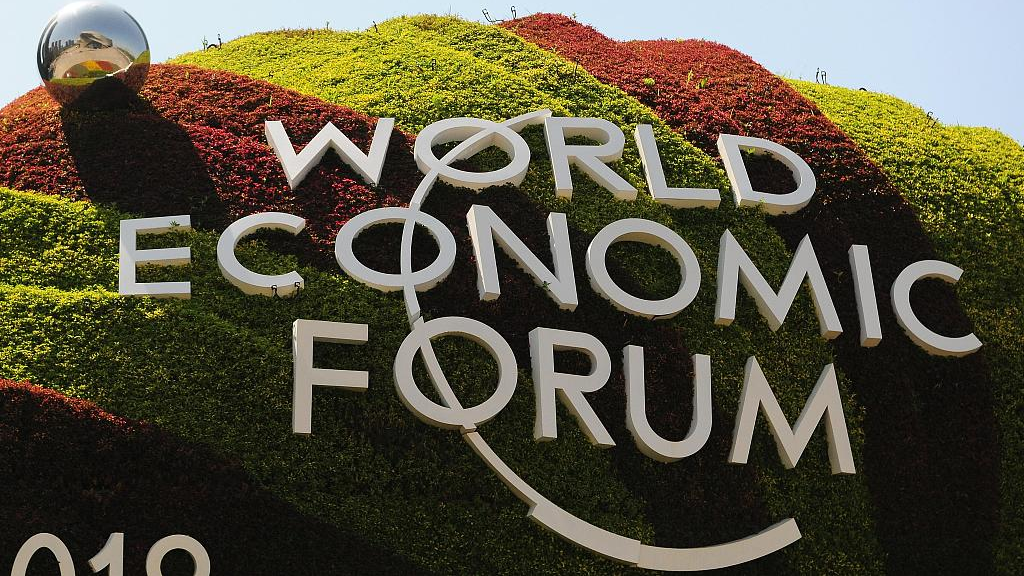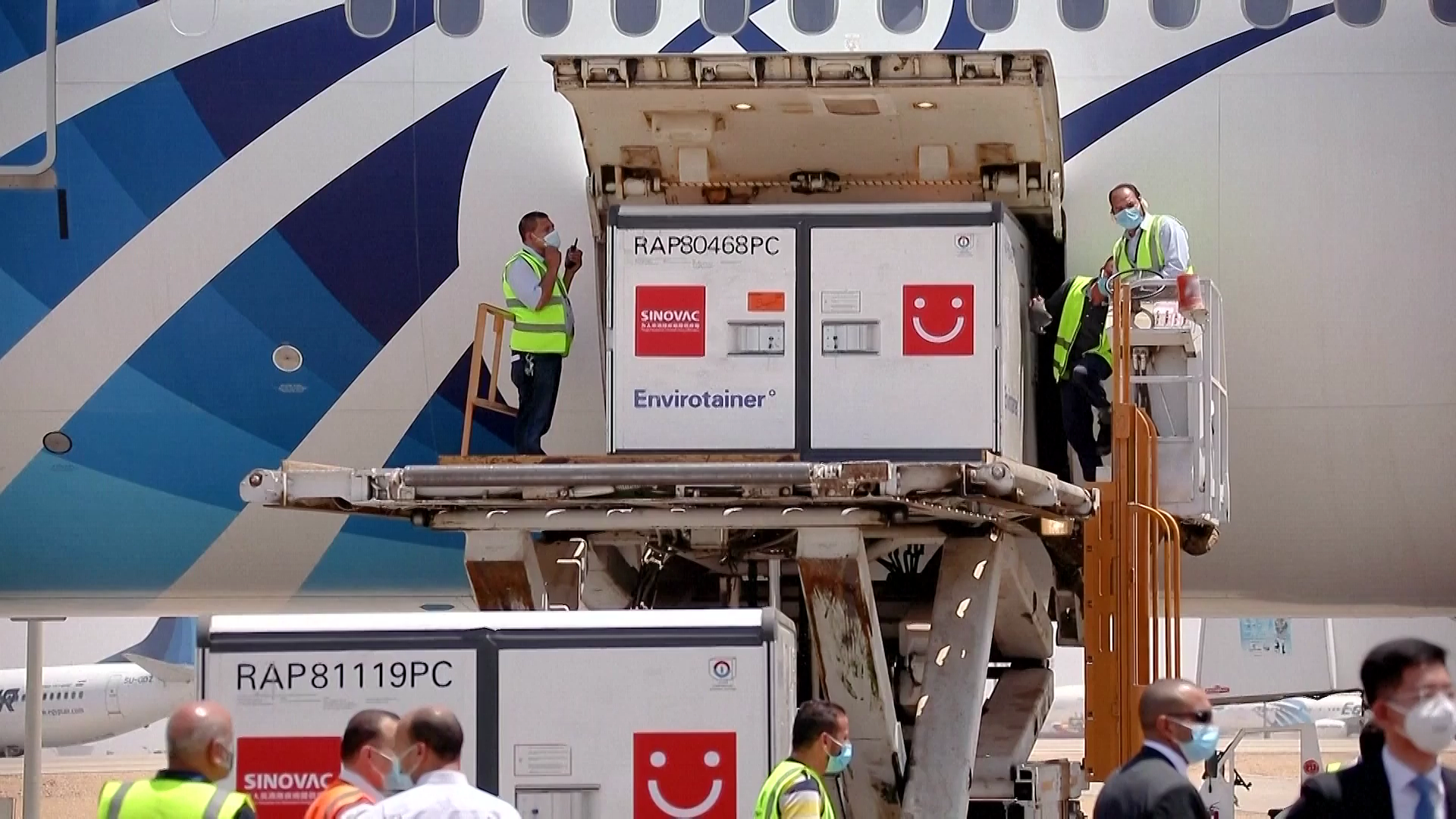
The logo of World Economic Forum's Annual Meeting for New Champions in Dalian, Liaoning Province, China, July 3, 2019. /CFP
The logo of World Economic Forum's Annual Meeting for New Champions in Dalian, Liaoning Province, China, July 3, 2019. /CFP
Editor's note: John Ross is a senior fellow at the Chongyang Institute for Financial Studies, Renmin University of China. The article reflects the author's opinions and not necessarily the views of CGTN.
In his speech at the 2022 World Economic Forum virtual session on January 17, Chinese President Xi Jinping laid out China's analysis of the overall international situation and the serious challenges to the whole of humanity which it represents.
These challenges include the fight against COVID-19, the fact that the pandemic has created a global economic downturn that led to a serious rise in world poverty in developing countries with the Human Development Index falling for the first time in 30 years, the threat of climate change, armed conflicts in some parts of the world, and that even within the developed economies poverty has significantly increased.
The answer to these problems, President Xi emphasized, requires international cooperation not international confrontation. As he put it, countries are not riding separately in some 190 small boats, but are rather all in a giant ship on which the world's shared destiny hinges. In this situation, he stressed, Cold War mentality is very dangerous, and so are the irresponsible remarks which incite hatred and prejudice.
He noted that history has repeatedly proven that confrontation brings disastrous consequences. In the field of economy, by engaging in protectionism and unilateralism, no one can protect anyone, and it will be harmful in the end.
He noted that to engage in hegemony is to move against the trend of history and that peaceful development and win-win cooperation are the right path. Different countries and civilizations should develop together while respecting each other and seeking common ground while reserving differences for win-win cooperation.
On the same day that President Xi made this speech, data published concerning China confirmed the key role the country is playing in the joint international effort to confront these serious threats. China's economy grew by 8.1 percent in 2021, following 2.2 percent in 2020. Data shows that China, as after the 2008 international financial crisis, is the main locomotive of global economic recovery.
This powerful international effect of China in maintaining world economic growth was reflected in its trade data for 2021: China's imports rose in dollar terms by 30.1 percent in 2021 compared to 2020 and its exports rose by 29.9 percent.

COVID-19 vaccines donated by China arrive at Cairo, Egypt, May 21, 2021. /CFP
COVID-19 vaccines donated by China arrive at Cairo, Egypt, May 21, 2021. /CFP
In terms of controlling COVID-19, China has a record which is not approached by any other large country. Since the beginning of the pandemic in January 2020, the Chinese mainland has suffered 4,636 deaths, compared to, for example, over 850,000 in the U.S. – despite China having more than four times the population of the United States.
If China had the same number of deaths per capita as the U.S., there would be 3.6 million people dead in China, to add to the 5.5 million people who have died internationally because of the coronavirus.
In summary, China's policies have not only protected the health and the economic situation of the Chinese people, they have also been an enormous contribution internationally.
These calm proposals for cooperation were, unfortunately, in striking contrast to the type of bellicose confrontational rhetoric coming from politicians in a few countries. This latter type of rhetoric is against the interests of the people in the countries in which such statements are made against global interests. They are also ineffectual.
For example, despite the tariffs introduced by former U.S. President Donald Trump, trade between China and the U.S. increased by 28.7 percent in 2021, rising to $755.6 billion. China's exporters were therefore not negatively hit but studies by consultancies such as Oxford Economics showed U.S households were paying hundreds of dollars a year in raised prices due to the tariffs. So, the big loser from the U.S. tariffs was not China but U.S. families.
Similarly in India, unfortunately, the government has recently attempted to engage in inflammatory rhetoric and banned Chinese apps such as TikTok, which had been wildly popular in India as in the rest of the world. Despite this, data shows that China-India trade rose by 43.3 percent in 2021 compared to 2020 to $125.66 billion.
In short, while some politicians are engaging in irresponsible and damaging behavior, individuals and companies are getting on with developing precisely the type of mutually beneficial relations which President Xi stressed.
But, of course, irresponsible behavior has negative consequences. Some problems cannot be resolved purely by activities of individuals. For example, controlling the pandemic, or dealing with climate change, are problems that can only be solved through government-led action. It is indeed, therefore, absolutely necessary to push aside confrontational rhetoric and insist on international cooperation.
Xi Jinping, naturally, was speaking at the Davos meeting as China's president – so of course he expressed China's national interests. But China's national interests, particularly at present, coincide with the interests of the peoples of other countries.
As he put it, countries are not riding on more than 190 small boats, but on a big boat with a shared destiny. The more this is emphasized to every politician in the world, the greater will be the progress.
(If you want to contribute and have specific expertise, please contact us at opinions@cgtn.com.)

